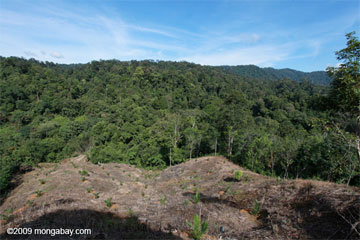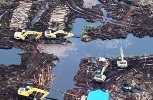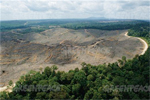Asia Pulp & Paper, which has long been a target of green groups for deforestation and threatening imperiled species, is touting a new audit the pulping company says finds allegations made by environmental NGOs, including Greenpeace and WWF, are “baseless, inaccurate, and without validity”. Conducted by the international accounting and auditing firm Mazars, the audit itself has not been released; however Mazars has signed off on the validity of a 24 page document entitled “Getting the Facts Down on Paper”.
After years of tough environmental criticism of APP’s practices in China, Cambodia, and, most vehemently, on the Indonesian island of Sumatra, a number of large corporations— including Staples, Woolworths, Gucci Group, and Office Depot—have dropped APP products from their stores and supply chains. In addition, the Forest Stewardship Council (FSC), a forest products certification body, revoked its approval of APP after negative coverage by the Wall Street Journal. In response, APP hired Ogilvy & Mather, a global PR firm, to develop a marketing strategy that would burnish its image as an environmentally-responsible company. APP now features images of verdant forests and bird sounds on its web site and has environmental ads on CNN and in other media.

Deforestation in Sumatra. Photo by Rhett A. Butler 2009 |
In its new report APP, a subsidiary of Sinar Mas, says the as-yet-unreleased audit shows how the company is “fulfilling its obligations to operate in a sustainable and environmentally conscious way”. In its report, APP denies that Indonesia is the world’s third largest emitter of greenhouse gases due largely to deforestation, peatland draining, and fires. It also states that it has set aside 400,000 hectares of land for conservation purposes, and has recently joined a partnership to save the Java rhinoceros.
According to the document, since 1996 APP has only been developing degraded or low conservation-value areas, but does not provide definitions of these terms. It also states that the net carbon of its paper is close to zero given carbon sequestration of its plantations. However, the analysis of its carbon did not include deforestation or the draining of peatlands, which environmentalists say is a substantial source of greenhouse gas emissions.
“[The audit] demonstrates to the public — without question — APP’s absolute commitment to transparency and sustainability,” Aida Greenbury, APP’s director for sustainability and stakeholder engagement, told the Jakarta Post.
However Greenpeace South East Asia Forest Team Leader Bustar Maitar shot back at APP’s report in a statement, saying “[the report] is not worth the paper it’s written on. It is long on hype and conjecture and short on fact. The reality is that APP continues to trash Sumatran rainforests, including tiger habitat, and to destroy carbon rich peatlands”.
To back up its claims, Greenpeace has released images which it says shows APP clearing forest on deep peatlands, a practice that is illegal in Indonesia but widespread. Other photos show forest destruction near Bukit Tigapuluh National Park.
In APP’s document the company contends that the area surrounding Bukit Tigapuluh National Park is ‘production forest’ and therefore open to development. However the company also pledges it will “not receive any pulpwood from the area” until an agreement is made by a multi-stakeholder assessment, including the Indonesian government.
In the past APP has been accused of illegally logging (without proper permits) orangutan habitat, clearing forests in a UNESCO biosphere reserve, illegally building a road through peatland forest, destroying tiger habitat, and threatening re-introduced populations of orangutans with legally obtained concessions, among other allegations.
|
Asia Pulp & Paper, a brand long targeted by activists for its environmental record and misleading advertising campaigns, today denied recent allegations by Greenpeace that its owners are engaged in damaging logging practices. In issuing its report, titled “Getting the Facts Down on Paper” [PDF], Asia Pulp & Paper (APP) notes it does not directly own or manage any forest concessions but that its products are produced by several pulp and paper companies in Indonesia including PT. Indah Kiat Pulp & Paper Tbk, PT. Pindo Deli Pulp and Paper Mills, PT. Pabrik Kertas Tjiwi Kimia Tbk, PT. Lontar Papyrus Pulp & Paper Industries, PT. Ekamas Fortuna and PT The Univenus. The report goes on to state there “is no legal entity named Sinarmas Group”, apparently aiming to distinguish itself from Sinar Mas, the Indonesian conglomerate that lists APP on its own home page. |
Related articles
Large-scale forest destruction in Sumatra undermines Indonesia’s deal with Norway

(07/13/2010) While the Indonesian government basks in a recent agreement with Norway to slow deforestation to the tune of a billion US dollars, a new report by Eyes on the Forest shows photographic evidence of largely government sanctioned deforestation that flouts several Indonesia laws. Potentially embarrassing, the report and photos reveal that two companies, Asian Pulp and Paper (APP) and Asia Pacific Resource International (APRIL), have destroyed 5 percent of Riau province’s forests since 2009, including deep peatlands, high conservation value forests (HCVF), Critically Endangered Sumatran tiger habitat, and forest within the Giam Siak Kecil- Bukit Batu UNESCO Biosphere Reserve. In total, over 130,000 hectares (an area larger than Hong Kong) of mostly peat forest were destroyed for pulp.
Walmart fires back at Greenpeace over deforestation charges

(07/07/2010) Walmart on Wednesday fired back at Greenpeace after the activist group linked the retail giant to destruction of Indonesia’s rainforests through its purchases from Sinar Mas Group’s Asia Pulp & Paper (APP), a Singapore-based firm associated with destructive logging practices. Noting that it was already working with Greenpeace to eliminate deforestation from its supply chain, the world’s largest retailer said it “does not support deforestation” and does not source from APP for its “largest markets.” Walmart said it was “surprised” Greenpeace targeted it in a recent press release announcing a new report.
KFC, Walmart contributing to destruction of Indonesia’s rainforests, endangering orangutans

(07/05/2010) Major U.S. companies are contributing to the destruction of Indonesia’s rainforests by sourcing paper from Asia Pulp and Paper (APP), a subsidiary of Indonesia-based conglomerate Sinar Mas, alleges a new report from Greenpeace. Investigating two sites on the Indonesian island of Sumatra, the activist group documented destruction of rainforests and carbon-dense peatlands by APP, a company that has lost several major contacts in recent years due to its poor environmental record. Greenpeace called out Walmart, Auchan, and Kentucky Fried Chicken (KFC) as companies that continue to buy from APP despite its role in deforestation and peatlands degradation.







